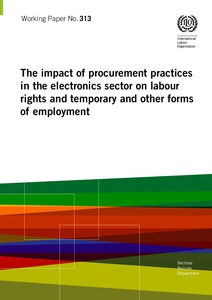The impact of procurement practices in the electronics sector on labour rights and temporary and other forms of employment
"The Global Dialogue Forum on the Adaptability of Companies to Deal with Fluctuating Demands and the Incidence of Temporary and Other Forms of Employment in Electronics, held in Geneva 9-11 December 2014, requested a series of actions to be taken by the International Labour Office (ILO), which...
| Main Author: | |
|---|---|
| Institution: | ETUI-European Trade Union Institute |
| Format: | TEXT |
| Language: | English |
| Published: |
Geneva
2016
ILO |
| Subjects: | |
| Online Access: | https://www.labourline.org/KENTIKA-919612473789-The-impact-of-procurement-prac.htm |
| Summary: | "The Global Dialogue Forum on the Adaptability of Companies to Deal with Fluctuating Demands and the Incidence of Temporary and Other Forms of Employment in Electronics, held in Geneva 9-11 December 2014, requested a series of actions to be taken by the International Labour Office (ILO), which included among other things to conduct research on the impact of purchasing practices in the electronic sector on labour rights and temporary and other forms of employment. Additionally, the Meeting of Experts on Non-Standard Forms of Employment held in Geneva on 16-19 February 2015 put the Office in charge of documenting and analysing trends on the effects of non-standard forms of employment on workers and their protection.
The electronics industry is characterized by supply chains network with a high level of outsourcing and subcontracting. In recent years, lead firms have increasingly outsourced manufacturing, as well as pre- and post- manufacturing activities. This led to the development of large intermediary contract manufacturers, working with a vast base of suppliers. For instance, Foxconn has grown to become the world’s largest contract manufacturer of electronic goods, and manages a vast network of buyers and suppliers. In this context of multi-tiered production, suppliers face numerous challenges regarding timing, and a context of very flexible employment has emerged, with among other things employers resorting extensively to temporary workers." |
|---|---|
| Physical Description: | 45 p. Digital |

